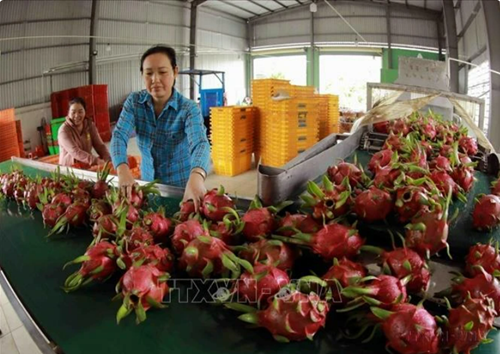Since the establishment of the diplomatic ties on January 18, 1950, bilateral relations have maintained robust growth, and attained important achievements. Particularly, the comprehensive strategic cooperative partnership set up in 2008 has created rapid progress in the bilateral relations in a deeper and more comprehensive manner across all areas. The ties have been further consolidated and enhanced with added future strategic orientations following the visit of the then Party General Secretary Nguyen Phu Trong to China in October 2022, and that to Vietnam by General Secretary of the Communist Party of China Central Committee and President of China Xi Jinping in December 2023.
    |
 |
|
Vietnamese dragon fruits have been exported to China via official channels. |
The growth momentum has continued so far this year, with the cooperation spirit having spread strongly to all levels, sectors, and people from all walks of life.
Over the past time, Vietnam and China have inked various bilateral and multilateral deals, including the ASEAN- China Free Trade Agreement (ACFTA) and the Regional Comprehensive Economic Partnership (RCEP). China is also working towards joining the Comprehensive and Progressive Agreement for Trans-Pacific Partnership (CPTPP).
Vietnam has several advantages in exporting its products to the Chinese market on the back of geographical proximity, similar consumption habits between the two countries, and traditional trade ties, according to the Ministry of Industry and Trade (MoIT).
Statistics from the General Department of Vietnam Customs showed that Vietnam's exports to China in 2023 rose 5.6% year-on-year to 61.2 billion USD, with China continuing to be the largest trade partner and second largest export market of Vietnam. During January-July this year, Vietnam shipped 32.6 billion USD worth of products to China, up 5% against the same time last year, while importing 79.6 billion USD worth of Chinese goods, rising 35.6% year-on-year.
Vietnam’s main exports to China are mobile phones, parts, electronic equipment, rubber, agricultural products, seafood, among others, and its imports include machines, equipment, materials for garment and textile and leather shoes industries, steel, and building materials.
Vietnam boasts various kinds of agricultural products that have won the taste of consumers across the globe, and China is currently Vietnam’s second largest consumer of farm produce. However, China is completing its legal import regulations, and tightening the management of imported agro-forestry-fishery products.
The MoIT suggested local firms update themselves on market trend and taste, heading towards producing high-quality products, enhancing regional access, and switching to official export channels.
Chairman of Ben Tre Coconut Investment JSC Tran Van Duc expressed his hope that China will open its market for Vietnamese coconut, saying it is a potential market which consumes some 4.1 billion coconuts every year.
General Secretary of the Vietnam Fruit and Vegetables Association Dang Phuc Nguyen said China has been the largest market of Vietnamese fruits and vegetable, accounting for 64% of the industry’s total export revenue with 2.1 billion USD in the first half, up 22% year-on-year.
According to him, durian has been favored by Chinese consumers. If coconut is exported to the market via official channels, it will help further bolster the export of fruit and vegetables. When the letter of intent to export fresh coconut to China is signed, the sector could earn some 300-400 million more USD per year from this market.
Source: VNA